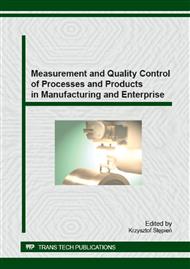p.1
p.7
p.13
p.21
p.27
p.37
p.45
p.57
p.69
MSA Planning - A Proposition of a Method
Abstract:
Measurement System Analysis (MSA) comprises a set of methods aiming to identify and assess variation of measurement results that can be assigned to a measurement system (gauge, personnel, procedure, standard, ambient conditions, etc.). It became a requirement of quality management systems in automotive industry, according to ISO/TS 16949. Moreover, most of automotive suppliers have to meet OEMs requirements specified in APQP (Advanced Product Quality Planning), PPAP (Production Part Approval Process) and MSA manuals. Many other industries adopted the same approach, expecting their suppliers to perform MSA in compliance with the above guidelines. The basic requirement regarding MSA scope is that it should be carried out for all measuring instruments referred to in Control Plans. Among methods available, gauge R&R seems to be the most popular method of measuring system capability assessment. However, although the assessment has to be performed periodically, none of the above mentioned guidelines suggest any method for MSA planning. The paper describes a few propositions on how the problem can be practically resolved basing on a risk associated with each measurement system. The first proposed method is based on simple risk analysis, which can be easily run together with developing a Control Plan. It uses process capability index (required or achieved) and characteristics impact on product/process function for making a decision on MSA frequency and scope. The variant of the method uses gauge robustness assessment as another risk factor.The other proposition assumes that a process FMEA (Failure Mode and Effects Analysis) is developed. The method uses performed FMEA to establish priorities for MSA. Basing on the priorities, frequency and scope of MSA can be planned.
Info:
Periodical:
Pages:
45-56
DOI:
Citation:
Online since:
February 2015
Authors:
Price:
Сopyright:
© 2015 Trans Tech Publications Ltd. All Rights Reserved
Share:
Citation:


